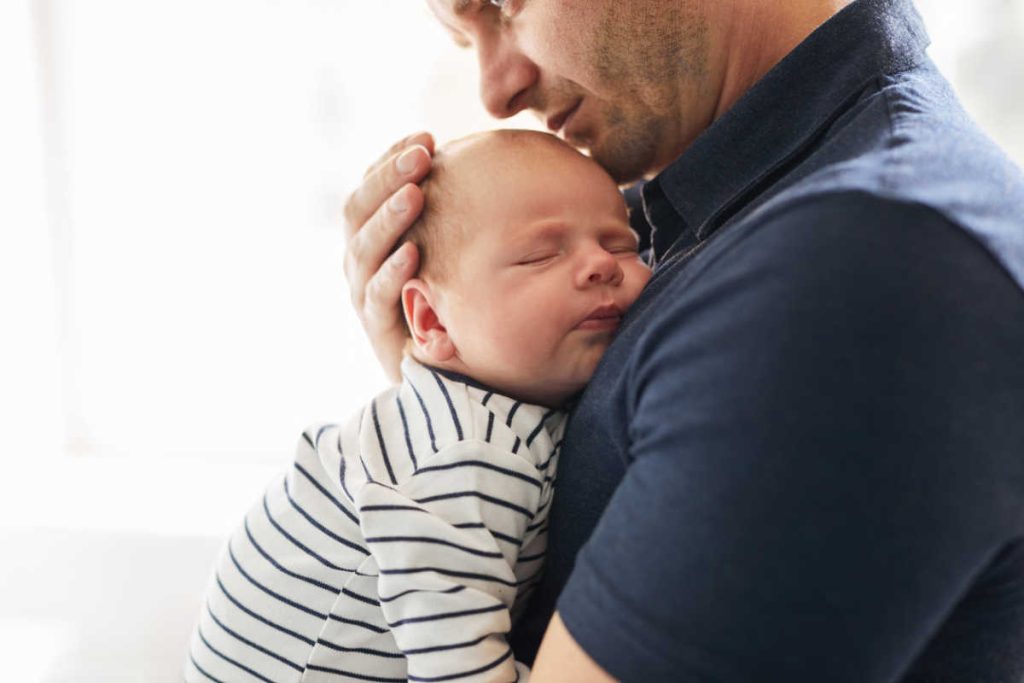A man’s desire to have a baby with someone is influenced by factors such as love, shared values and goals, trust, financial stability, emotional readiness, relationship quality, support systems, age, and personal motivations.
Moreover, open and honest communication between partners about their desires and expectations is crucial to ensure a shared commitment to parenthood. Consent and mutual readiness are essential for a healthy family life.
How does Emotional Connection and Love Affect Family Planning?
Imagine a world where family planning isn’t just about numbers and logistics but is deeply intertwined with the intricate web of emotional connections and love that bind couples and families together.
The Role of a Strong Emotional Bond in the Desire to Start a Family
When a man shares a strong emotional connection with his partner, it often fosters a sense of security and trust in the relationship. This emotional bond can be a crucial factor in his desire to start a family. Here’s a deeper understanding:
Security: Emotional bonds create a safe and nurturing environment, which is seen as conducive to raising children. When a man feels emotionally secure with his partner, he may be more inclined to envision a future together that includes having children.
Desire for Togetherness: Love and emotional connection often make the prospect of parenthood more appealing. The idea of creating a family with someone they deeply care for can be a powerful motivator.
Shared Dreams: An emotional connection can lead to shared dreams and aspirations. Men who are emotionally connected to their partners are more likely to share the dream of becoming parents, as it represents an extension of their shared life journey.
How Love for a Partner Can Be a Motivating Factor?

Love is a profound emotion that can be a driving force in the decision to have a baby. Here’s a deeper look at how love influences this choice:
Emotional Fulfillment: Love often brings emotional fulfillment, and for many people, having a child together is an expression of their love and commitment. It’s a way of cementing their bond and sharing their love with a new generation.
Responsibility and Care: Love for a partner can translate into a desire to care for and nurture a child together. Furthermore, the motivation to provide a loving and supportive environment for the child stems from the love they have for each other.
Creating a Legacy: Some men may view parenthood as a way to create a lasting legacy of their love and partnership. In addition, they want to leave behind a family that embodies the love they share.
How do shared values impact the desire for a baby?
Long-term compatibility in goals is a fundamental consideration when deciding to have a baby. Here’s a deeper insight into this aspect:
Alignment in Priorities: Couples who share common long-term goals are more likely to navigate parenthood smoothly. They have similar priorities and can work together toward the common goal of raising a family.
Reducing Conflicts: When partners have conflicting long-term goals, it can lead to tensions and disagreements in the relationship. Compatibility in goals reduces the likelihood of such conflicts, creating a stable environment for child-rearing.
Planning for the Future: Shared long-term goals often involve planning for the future, and having a baby is a significant part of that planning. Couples who share these goals are more likely to proactively prepare for parenthood.
The Importance of Shared Family Values in the Decision
Shared family values are a critical component of the decision to have a baby. Here’s a deeper understanding of their significance:
Parenting Philosophy: Family values influence how parents approach parenting. Couples with shared values are more likely to agree on important aspects of child-rearing, such as discipline, education, and cultural or religious practices.
Cultural and Religious Beliefs: For many couples, shared cultural and religious values play a significant role in their decision to have children. Moreover, these values can guide their choices in raising a child within a specific cultural or religious framework.
Strengthening the Family Unit: Shared family values can strengthen the family unit. When both partners are aligned in their values, it creates a cohesive and harmonious environment in which to raise a child.
What’s the role of trust in deciding to have a child?
Trust and commitment are foundational to a healthy and lasting relationship. Here’s a deeper understanding of their importance:
Security and Emotional Well-being: Trust in a relationship creates a sense of emotional security. When a man trusts his partner, he feels safe and comfortable in the relationship, which is essential for considering parenthood.
Long-Term Perspective: Commitment signifies a long-term perspective in a relationship. A man’s commitment to his partner suggests that he is willing to invest in a shared future, including raising a family together.
Effective Communication: Trust and commitment promote open and effective communication. Partners who trust each other are more likely to discuss their desires and concerns regarding parenthood honestly.
How Trust Can Influence a Man’s Desire for Parenthood with a Partner?
Trust can significantly impact a man’s readiness to become a parent. Here’s a closer look at how trust plays a role:
Co-Parenting Confidence: Trusting a partner’s ability to be a good co-parent is crucial. A man who believes his partner is trustworthy and reliable is more likely to want to embark on the journey of parenthood together.
Sharing Responsibilities: Trust fosters a sense of mutual responsibility in child-rearing. A man is more inclined to have a baby with someone he trusts to share the responsibilities of parenting equitably.
Conflict Resolution: Trust enables effective conflict resolution. Parenthood inevitably comes with challenges and disagreements; however, trust facilitates the resolution of these issues in a healthy and constructive manner.
How does financial stability affect family planning?
Financial stability is a critical consideration when planning for a family. Here’s a deeper understanding of its role:
Providing for Basic Needs: Financial stability ensures that a child’s basic needs, such as food, shelter, clothing, and healthcare, can be met. It creates a foundation of security for the child’s well-being.
Education and Opportunities: However, financial stability allows parents to invest in their child’s education and extracurricular activities, providing opportunities for growth and development.
Reducing Stress: In addition, financial stability can reduce stress and anxieties related to providing for a child’s needs, allowing parents to focus on nurturing and bonding with their child.
Ensuring a Stable Income and Financial Plan for the Child’s Needs
Planning for a child’s financial needs requires careful consideration. Here are key insights into this aspect:
Budgeting and Saving: Financial planning involves budgeting and saving for anticipated expenses related to childbirth and child-rearing, including medical costs, childcare, and education.
Emergency Fund: Establishing an emergency fund provides a safety net for unexpected expenses, helping to maintain financial stability during challenging times.
Long-Term Investments: Moreover, parents often consider long-term investments, such as college savings accounts, to secure their child’s future.
What contributes to emotional readiness for parenthood?
Emotional readiness is a fundamental aspect of becoming a parent. Here’s a deeper understanding:
Patience and Tolerance: Parenthood demands patience and tolerance as children grow and develop. Emotional readiness involves being prepared for the ups and downs of parenting.
Unconditional Love: Moreover, emotional readiness includes a deep capacity for unconditional love and nurturing. Parents need to provide emotional support to their children throughout their lives.
Resilience: Being emotionally ready means being resilient in the face of challenges. Parents must adapt and learn as they navigate the responsibilities and complexities of raising a child.
Considerations Related to the Responsibilities and Challenges of Raising a Child
Raising a child comes with various responsibilities and challenges. Here are insights into what emotional readiness entails:
Lifestyle Adjustments: Emotional readiness involves being prepared to adjust one’s lifestyle to accommodate the needs and routines of a child.
Teamwork and Support: Additionally, recognizing the importance of teamwork and seeking support from friends and family can help parents cope with the challenges of parenthood.
Empathy and Understanding: Parents need to be emotionally ready to empathize with their child’s experiences, understand their perspectives, and provide a nurturing environment for growth.
How does a strong relationship affect the desire for a baby?
A healthy, communicative relationship plays a vital role in encouraging family planning. Here’s a deeper understanding:
Shared Goals: In a healthy relationship, partners often share their long-term goals and aspirations. This communication allows them to align their desires for family planning and work towards these goals together.
Effective Communication: Open and honest communication is a cornerstone of a healthy relationship. Discussing the desire for children, preferences, and concerns becomes more manageable in an environment where both partners communicate effectively.
Conflict Resolution: Healthy relationships have effective conflict resolution mechanisms in place. When discussing family planning, conflicts and disagreements can arise. However, a strong relationship can handle these challenges constructively and find mutually satisfactory solutions.
How does age impact the decision to have a child?

The age of both partners is a significant factor in family planning. Here’s a deeper understanding of its importance:
Fertility: Age can affect fertility, particularly for women. As women age, their fertility declines, which can influence the timing of when a couple decides to have a baby.
Health Considerations: In addition, age can also be associated with certain health considerations. Older parents may face different health challenges during pregnancy and parenthood compared to younger parents.
Life Stage: However, age often corresponds with specific life stages and personal goals. Couples may choose to have children at a time that aligns with their life plans and ambitions.
The Influence of Biological Factors and Readiness for Parenthood
Biological factors and readiness for parenthood are interrelated. Here’s a deeper insight:
Biological Clock: The biological clock, especially for women, can influence the timing of family planning. Couples need to consider the biological factors that affect fertility and the potential challenges associated with waiting.
Readiness: Readiness for parenthood encompasses emotional, financial, and practical preparedness. Age can be a factor in determining when a couple feels they are adequately prepared for the responsibilities of parenting.
Life Experience: Age often brings with it life experiences and personal growth. Couples may choose to have a child at a specific age when they feel they are emotionally and psychologically equipped for parenthood
FAQ’s
Why does a man want to have a baby?
Men may want to have a baby for various reasons, including a desire for parenthood, emotional fulfillment, continuation of their legacy, or strengthening their relationship with a partner.
Why would a man want to have a baby with you?
A man might want to have a baby with you because he loves you and wants to build a family together. Parenthood can also be a shared goal or a natural progression in a committed relationship.
How do you know if a man wants a baby with you?
A man may convey his desire for a baby by discussing future plans, showing genuine interest in your well-being, and actively participating in conversations about family and children.
How do you know if a guy has a baby fever?
Signs of “baby fever” in a guy may include heightened interest in babies, frequent discussions about having children, and increased attention to parenting-related topics and responsibilities.
What is the best age to have a baby for men?
There is no one-size-fits-all answer to the best age for men to have a baby, as it varies based on individual circumstances. Generally, men can become fathers at various ages, but many choose to do so in their late 20s to early 40s.
What does a man need to get a woman pregnant?
To help conceive a child, a man needs healthy sperm, which typically involves maintaining overall good health, managing stress, and practicing safe, consensual sexual activity with a fertile partner.
Final Words
In conclusion, a man’s decision to have a baby with a partner is influenced by a multitude of complex factors that encompass emotional, relational, and practical considerations. Love and emotional connection create a strong foundation, while shared values and long-term goals provide a practical framework for family planning.
Trust and commitment are essential for a healthy relationship, which, in turn, encourages the desire to start a family. Financial stability ensures that the child’s needs can be met, and emotional readiness prepares individuals for the responsibilities of parenthood. A supportive partnership and environment play pivotal roles in easing the challenges of raising a child.











